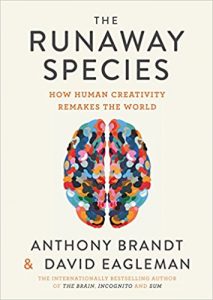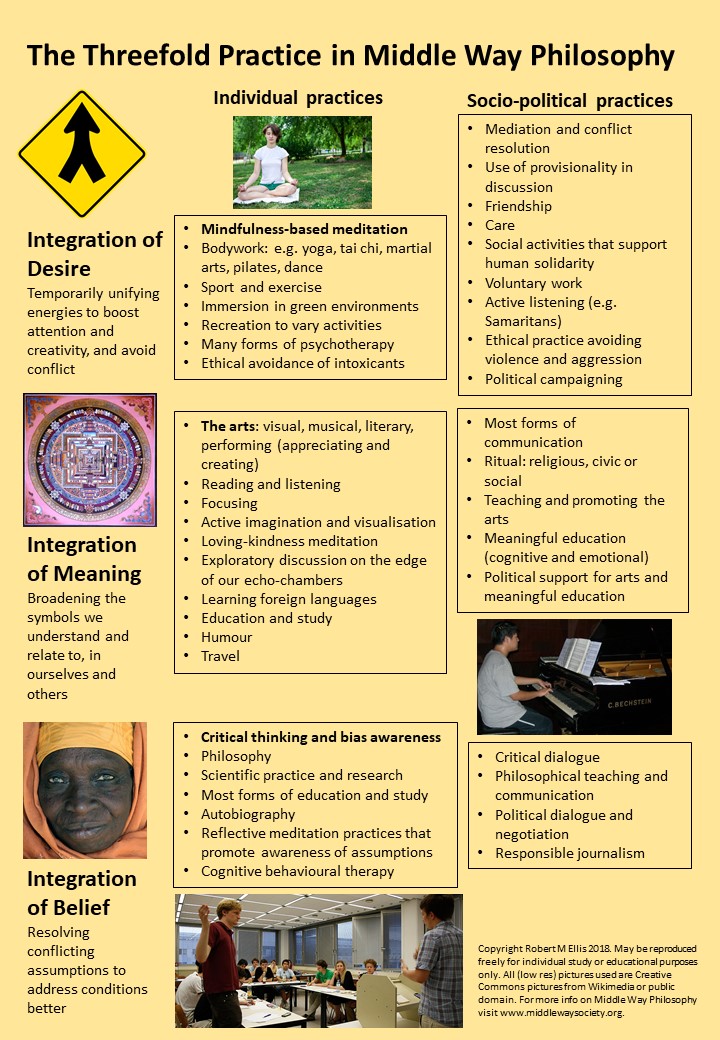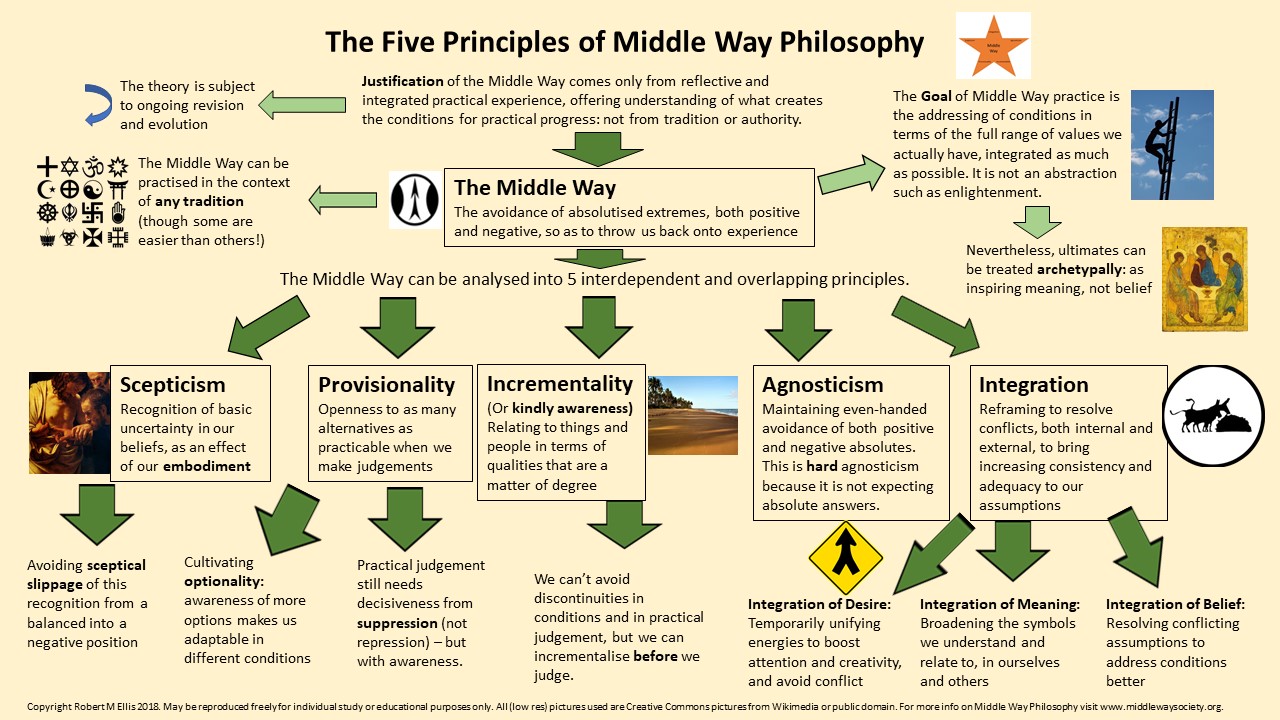I’ve recently been involved in a discussion that still feels like the most depressing ever. It started with me trying to gather perspectives for the book I’m writing about S, a well-known Buddhist teacher (I’m going to deliberately avoid specific details and names here), by posting a question on a Buddhist forum on Facebook. I wanted to find arguments that his critics would use against him so as to make sure that I took them into account. But the critics only wanted to discuss one thing: certain practical shortcomings in the behaviour of that teacher, that they believed justified them in dismissing everything he might have said or written. They wanted me to agree with them, and regarded me as biased if I didn’t. Even after I’d quit the discussion of this on Facebook, one of the critics contacted me to continue it by email. What I find most depressing is that this was a very highly-educated, thoughtful person, an expert in mindfulness – but we nevertheless made no progress at all, instead having a protracted, ill-natured, tedious wrangle that ended up, not with agreement, but with him shutting down the discussion because he was bored with it.
This has stimulated further more general reflections about why discussions fail, even when everyone involved in them sincerely believes that they are pursuing ‘truth’, or ‘rationality’, or being ‘reasonable’, and when they do have some self-awareness of the kind you might expect from a regular meditator. Even the supposed experts fail. I am thinking primarily of text-based discussions on the internet, though many of the same points can also apply even in face-to-face discussions. I’ve come up with ten things that people do that cause discussions to fail – not based only on this example, but also many others that I’ve experienced, together with ongoing thinking about the difficulties in applying the Middle Way.
These ten are:
- Provisionality markers are ignored
- Impersonal points are read personally
- Language is essentialised
- Motives are ascribed, or assumed to be ascribed
- Unrealistic expectations are based on someone else’s position
- Unrealistic expectations of one’s own position inhibit learning
- Cognitive bias awareness becomes another weapon
- Helpful information is interpreted as condescending
- Analysis and reflective summarising are boring
- Mediating intentions are not adopted or respected
You might ask why these take a negative form, rather than ten ways that discussions succeed. The reason for this is that I think reasons for success are much harder to identify and generalise about, the reasons for failure being all in the end attributable to absolutisation as a general human tendency. Everything is grist for the mill of absolutisation. Nevertheless, reasons for success can emerge out of the avoidance of reasons for failure.
Here they are explained in more detail:
1. Provisionality markers are ignored
Provisionality markers are bits of language that can be used to try to signal that you’re talking provisionally, that you are just raising possibilities for other people to consider, you respect the autonomy of their judgement, and are not in any way trying to force them to adopt your perspective by absolutising. For example, the use of ‘seems’ or ‘appears’ to hedge what you’re saying. There’s a previous more detailed blog about provisionality markers, including lots of examples, here. The big problem that I find with using these, as noted towards the end of that blog, is that people routinely ignore or discount them, and thus I find that I have a tendency to over-rely on them. Sometimes I resort to putting them in bold or surrounding them with *asterisks* to try to draw people’s attention to them, but that’s more of a mark of my frustration than anything else. The only solution to this that I can envisage is either that more people are trained to use them, until a critical mass of social expectation is reached, or (even more idealistically) that they become unnecessary because everyone expects provisionality anyway. In the meantime, I will continue to use them just because they might help in some cases.
2. Impersonal points are read personally
We’re all probably familiar with the phenomenon of people ‘taking things personally’. What that seems to mean in practice is that people absolutise something as a threat to themselves that you merely offered as a possibility for their consideration. Nothing is actually impersonal, because our entire perspective is personally embodied, but impersonal language is nevertheless another way of being provisional, by prompting awareness of a wider context to what one is saying. For example, instead of saying “You’re defending cruelty and exploitation”, you can say “There’s a danger that people who adopt this kind of view may end up defending cruelty and exploitation”. In the fruitless discussion I referred to above, I twice pointed out that something my interlocutor had taken personally was deliberately phrased impersonally, but he ignored this, apparently not believing in my sincerity in doing so. He believed that the context justified him in continuing to interpret it personally, but of course this all depended on the framing assumptions with which he viewed the context and purpose of the discussion (see 10). As with provisionality markers, I shall continue to do this just because it might help – but very often it doesn’t – unless, perhaps, more people are consciously trained in using it and accepting when others use it. The principle of charity is another approach that can help to prompt more helpful readings here.
3. Language is essentialised
A lot of people seem to have strong implicit beliefs that words have an essential meaning that one can look up in a dictionary. I’m not criticising the use of dictionaries: they can be useful prompts both to clarity and recognising the different ways a word is used. However, the use of a word in one particular sense may continue to send our thoughts down one particular familiar track, and make it impossible to communicate an alternative possibility. A typical example of this is people’s belief that ‘religion’ must mean absolute beliefs, which forces all discussion of the topic down certain unproductive and polarised tracks. Discussion may then fail because people are using words in different ways and fail to recognise it, or because they believe the meaning of the word is ‘obvious’ and assume that the attempt to use a word differently must have some discreditable motive. To be able to think afresh, the recognition of a right to stipulation (defining a word for oneself) with a practically helpful motive, and an awareness of the need for clarification of language, are often crucial. That applies not only to big, baggy monsters like ‘nature’ or ‘religion’, but also often to words that can be used for evaluation, like ‘responsibility’, ‘reasonable’, ‘free’, or ‘right’. However, the attempt to do this in practice often runs into number 9 below – it’s tedious. For more on this point, see this previous blog.
4. Motives are ascribed, or assumed to be ascribed
A very common scenario in discussion is that one person feels or intuits another’s motives, believes too strongly in that intuition, and interprets everything they say in that light. A simple example might be if someone says something positive about someone you dislike – say, Donald Trump. It’s then incredibly easy to assume that they’re motivated by support for or bias towards Trump, when actually this doesn’t necessarily follow at all from their remark. This tendency is hardly surprising given how much our embodied heritage involves sizing others up as a threat or an opportunity. In face-to-face discussion ascribing motives to others might have more justification, because body language contributes to our impression of others’ motives, but people even do this on the internet with people they know nothing about, based on a few ambiguous words. The full avoidance of this is really difficult, and I’ve often found myself that although I might have avoided ascribing motives too directly, assumptions about others’ motives can easily creep in. The reverse problem is when someone thinks you have unfairly ascribed motives to them, even though you were only offering a provisional point for their consideration about something they said. Trying to separate views from the people who hold them (avoiding ad hominem) is the traditional cure for this, but there’s understandably a lot of debate about how far it may actually be necessary to take more of the person into account when addressing their views. Again, we can’t actually be impersonal, but the use of ‘impersonal’ perspectives is a useful awareness-raising device.
5. Unrealistic expectations are based on someone else’s position
I’ve found myself doing this a lot, particularly having unrealistic expectations of philosophers, psychologists, Buddhists, and academics. Others might have such expectations about teachers (of any kind), doctors, priests or any other kind of profession or position of responsibility. Such signals about someone’s past experience and training often lead me to assume that they will be aware at least of the cruder biases and fallacies, and able to engage in a discussion with a fair amount of awareness. Because of these expectations I am then inclined to push them harder than I would others. But these are also often an unrealistic expectations – not because these kinds of training don’t make a difference to people’s ability to engage in productive discussion, but because they don’t necessarily make enough of a difference. There are a variety of possible reasons for that, whether it’s the limitations of their training, the possibly unhelpful elements in their traditions, or just their personal limitations. Obviously, it’s necessary to respond to the person you encounter and what they actually say, rather than just the labels, before inappropriate expectations lead to deadlock as the person fails to fulfil them.
6. Unrealistic expectations of one’s own position can inhibit learning
The flip side of having unrealistic expectations of others is having unrealistic expectations of oneself. Personally I can find that these are often based on formalistic assumptions about what I know. I can assume that I know about biases, for example, because I’ve studied them, reflected on them and written about them. But that doesn’t necessarily stop me being subject to them. At the same time, when I refuse to acknowledge to others that I’ve been biased in a particular way, I find that people often assume that’s because of a hypocritical absolute position, rather than because I’ve weighed it up and concluded that I’m probably not actually subject to that bias (false modesty is another trap). It’s very easy to continue to rationalise biases because one substitutes intellectual understanding for practical reflection, and that can inhibit me in learning from others. But embracing such apparent learning to placate others in their preconceptions can be just as problematic. Only the organic development of confidence (in oneself) together with trust (from others) seems to offer a way round the failure of discussion for this kind of reason.
7. Cognitive bias awareness becomes another weapon
I’m thoroughly convinced of the usefulness of being aware of cognitive biases, but there seems little doubt that the use of that awareness in discussion can backfire spectacularly. This can often combine with point 2: even if you mention the possibility of a bias in an impersonal way, or ask a question about it, people can easily assume that it is just another weapon in your ‘biased’ argument, directed against them. Because they don’t experience the bias directly themselves, but only experience their view and the reasons they can give for it, they are likely to reject the idea that they have the bias out of hand, and to interpret your language in a way that makes the very suggestion a threat to their ‘rational’ autonomy. Phrasing it carefully, so as to try to make it clear that you respect their autonomy and are just offering a possibility they might think about, seldom works. The effective raising of cognitive bias awareness in discussion seems to depend on prior relationships of trust, shared goals and a degree of psychological training and awareness.
8. Helpful information is interpreted as condescending
The offering of helpful information, whether that’s about cognitive biases or any other point, can also backfire and disable the discussion, even if that information is crucially necessary to help the discussion proceed anywhere productive. I find personally that I’m particularly subject to charges of condescension. Presumably my critics would tell me that this is because I’m condescending, but I’m often not even sure what that means, beyond indicating the defensiveness of the accuser. It doesn’t seem to be based on my use of language that makes claims of personal superiority or anything of that kind: it is just that most language is ambiguous, and people interpret it in that way. When one offers information one takes a risk, firstly that it won’t be interpreted ‘personally’ (see 2), secondly that the recipient doesn’t already ‘know’ what you’re offering, in which case you may be accused of ‘insulting their intelligence’, and thirdly that they can make some use of this information. But if you are telling people something they either don’t ‘know’, or theoretically ‘know’ but haven’t really applied, then you are unavoidably reminding them of their limitations, which may trigger a reaction due to dissonance with their view of themselves. Again, I’m not convinced that phrasing this carefully makes a great deal of difference to this problem, even though I will carry on trying to do so.
9. Analysis and reflective summarising are boring
There is often only one possible way that I’ve discovered out of a deadlocked discussion in which people are entrenched in mutual misunderstanding. That is to go through everything very carefully, line by line, making it totally clear what is meant so as to unpick misunderstandings. This is related to another practice often used in mediation, which is getting people to summarise and agree the positions of others so they’re not being misrepresented. Both of these practices, though, have the drawback of being tedious, laborious and time-consuming. Usually, in a discussion, people are not prepared to spend the time necessary to overcome the deadlock through sheer analysis, even if they are able to engage in it. This was the issue in the recent discussion I mentioned in my introduction. Although we did reach a bit more mutual understanding through such analysis, it did not go far enough before the other person called time on it. It’s only if people consider the issue important enough, or perhaps if they’re philosophically trained, that they’re often prepared to go down this route.
10. Mediating intentions are not adopted or respected
This last reason is in my view the most important and underlying one. All of the above causes of deadlock in discussion are due to absolutisation of one kind or another: we assume that our language, our interpretation of that language, our interpretation of others and ourselves, or our assumptions about the best use of our time, are the whole story. The Middle Way offers the perspective that merely opposing that absolutisation with its negative counterpart is unhelpful. Instead we need to avoid the absolutisation altogether, by re-framing the situation in non-absolute terms that avoid the polarising assumptions. Where there are two polarised sides to a debate, it is only through clear mediating intentions that I think we can achieve this, but if others’ perspective is that their view is just correct and their goal is thus to ‘win’ rather than to mediate, that mediating intention can be rapidly undermined. I’ve experienced that happening, for example, in trying to question the acceptability of personal attacks on political opponents in a group of people who I mainly agree with politically. It takes some determination and autonomy to stand up to the group pressure that’s involved here, particularly when everyone else is determined to see you as on ‘the other side’ in some sense (or alternatively appropriate you to their side). In my experience you can try to make your mediating intentions clear, even to people who in theory ought to be sympathetic to them, but the discussion will still fail unless to some extent they share them. They need, at least to some extent, to recognise that their own view may not be the whole story, and to trust you sufficiently to believe that you’re not just trying to convert them to the other side’s case by underhand means.
Conclusion
This list is written in a mood of some pessimism, in which it’s been brought home to me yet again just how difficult it is to make discussion work as a way of engaging with or resolving disagreement, particularly on the internet. I’m aware that many people will respond that these are precisely the sorts of reasons why they don’t engage in internet discussion. I fully understand their reasons for doing so: there’s no doubt that it can be time-consuming, stressful and frustrating. Others will respond by withdrawing to echo chambers in which they only talk to those who will not challenge them. Yet, on the other hand is the reflection that many discussions on the internet occur that would not previously have occurred at all. This is potentially very enriching if one can use it wisely. Between fruitless and over-stressful discussion on the one hand, and echo chambers on the other, I still think there must be a Middle Way somewhere in which manageable amounts of challenge are to be found and progress can be made, with those who are sufficiently but not too sympathetic. But I must also admit that it’s often damned difficult to find that point of balance.
Picture: ‘Face Off’ by Aaron (Creative Commons: Wikimedia)





